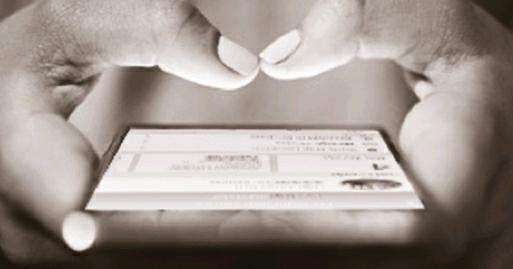我们为什么做不了决定?
2018-03-12ByJennyCoad
By+Jenny+Coad
“The risk of a wrong decision is preferable to the terror of indecision,” said Maimonides.1 How right he was. Today, we are racked with choice, and decision-making has never been more fraught.2 Its hell.
Look at restaurant menus. Anything longer than a page is alarming. So much margin for error3. “Hold on a minute, I just need another look.”“Whats the special4, again?” Glance at a neighbouring table. “That looks nice, is it the lamb?” Turn to your partner. “What are you having?”
At least youve settled on a restaurant. Organising a dinner out generates endless back and forth between companions, jostling politely for position, lobbying for a venue in a more convenient postcode, suggesting somewhere a little less expensive or a touch more on trend:5“Ive heard this place is good”, “Thats quite far…” “OK. What about x or y?” “Maybe z?”
Part of the problem is technology. Were in touch with everyone all the time via our phones and all looped into the decision-making process, whether on email, text message or WhatsApp.6 As a result, decisions can be delayed until the day, the hour before and even en route7.
I met two friends in an empty restaurant the other day. They had drinks in front of them but the chooser of the restaurant was nervously shifting in her seat. “Should we go somewhere else? Theres another place I read about up the road?” We hadnt even opened the menu. My friend clearly felt the burden of having made the call8. She didnt want to get it wrong—when the right thing could have been just around the corner.
Were constantly striving for perfection and its driving us to distraction9. Holidays present all sorts of headaches before youve even got to the airport. Budget withstanding10, the possibilities are endless. And we understandably place so much importance on our time away that the idea we might get it wrong fills us with dread.11 If its a special holiday, a honeymoon say, where do you begin? One friend changed her honeymoon arrangements on the strength of12 negative online reviews. Another booked and cancelled a sunshine getaway within the space of 24 hours. He lost faith in his choice.
There are so many options at our fingertips. Endless people telling us what they thought of this or that on sites such as Trip-Advisor13—guaranteed to hinder not help, with its wildly ranging views on the same place. “Dont bother”, “We loved it”. endprint
endprint
I tormented myself on a recent holiday in Lisbon by looking at Instagram and all the tasty images of food from local restaurants in which I wasnt eating.14 There was always somewhere better gleaming tantalisingly on the horizon.15 We trawled the streets, pondering one place over another, popping back to one, having a quick drink somewhere else before deciding to go with this—or that.16
We can buy things, return them for a full refund and not worry about losing a few pounds on the postage. Weve even coined a term for it, shopping bulimia, where a sackful of purchases are made and swiftly returned.17 Two hits of dopamine, once for the splurge and once for the refund, phew.18
Deciding on a single career path or climbing the ranks in one company is now regarded as positively old-fashioned. These days you are expected to diversify. Try something else. Perhaps have multiple jobs—just look at George Osborne19. But is such flexibility making us any happier? Im not sure. I wonder if instead we are permanently dissatisfied, always seeking the next thing. Constantly trying on slightly ill-fitting20 shoes.
That seems to be the case with dating. There are so many services, sites and apps that you can go on endlessly giving people a go. Anna Heaton, an attractive 29-yearold, has been in the news for having had 77 dates in two years. No one has yet measured up. Some might say shes picky21, others that she knows what she wants. Maybe she simply has a serious case of decision-fatigue22?
The American psychologist and philosopher William James believed there to be “no more miserable human being than one in whom nothing is habitual but indecision”.23 He would know. This was a man who changed his studies and career path multiple times, going from science to painting to natural history, followed up by medicine, then on to philosophy via psychology and physiology24.
Indecision is restless25, time-consuming, tiring. The trouble is that, increasingly, none of us know where we stand on anything.26
1. indecision: 优柔寡断,犹豫不决;Maimonides: 迈蒙尼提斯(1135—1204),中世纪犹太哲学家、医生、神学家。
2. be racked with: 受……折磨;fraught:令人苦恼的,使人忧虑的。
3. margin for error:(不影响最终结果的)误差幅度。
4. special: 特色菜。
5. 朋友間安排一次晚饭会引发一场无休止的讨论,彼此间礼貌性地争夺聚餐地点,劝别人选一个更方便的地点,再提议一个便宜点儿或是更受欢迎的地方。jostle for: 争夺,抢占;lobby: v. 游说;a touch: 轻微,些许。
6. loop: 使绕成圈;WhatsApp: WhatsApp Messenger,一款通信应用程序,类似于Wechat和Line。
7. en route:〈法〉在途中。
8. make the call: 做出决定。endprint
9. distraction: 心烦意乱。
10. withstand: 承受,禁得起。budget withstanding指“只要在预算范围内”。
11. 而且我们把出行看得如此重要(这可以理解),以至于特别害怕自己可能会安排得不好。dread: 惧怕,担心。
12. on the strength of: 基于,凭借。
13. Trip-Advisor: 猫途鹰,全球领先的旅游网站。
14. torment: 折磨;Lisbon: 里斯本,葡萄牙首都。
15. gleam: 闪闪发光;tantalisingly:// 挑逗性地,撩人地。
16. 我们在街上到处搜罗,考虑完这家考虑那家,先赶回一家店,然后去另一家迅速喝上一杯,同时考虑好下一站再去哪儿吃。trawl: 搜罗,网罗;ponder: 考虑,沉思;pop: (突然或匆匆)去。
17. coin: 杜撰;bulimia: // 贪食症;sackful: 一满袋的量,指很多,大量。
18. dopamine: 多巴胺,一种神经传导物质,与人的情欲和感觉相关,可传递兴奋及开心的信息,也与各种上瘾行为有关;splurge: 挥霍;phew: 咳,唷(表厌恶、不安、烦躁、惊讶等)。
19. George Osborne: 乔治·奥斯本(1971— ),英国前财政大臣(2010—2016),目前身兼多职,除了下议院后座议员身份外,还在《伦敦旗帜晚报》担任新闻编辑,并在全球最大资产管理公司美国贝莱德投资集团兼职当顾问。
20. ill-fitting: 不合适的。
21. picky: 挑剔的。
22. decision-fatigue: 决策疲劳,指一个人在做了一长串的决策之后决策质量开始下降的状态。
23. 美国心理学家和哲学家威廉·詹姆斯认为,“如果一个人除了犹豫不决之外没有别的习惯,那么没有谁比他更悲惨了。”
24. physiology: 生理学。
25. restless: 永无止境的。
26. 最要命的是,我们对于哪些东西应该坚持越来越没把握。
阅读感评
∷秋叶 评
法国作家加缪(Albert Camus)曾告诉我们说:“生活即许多抉择的总和(Life is the sum of choices)”。其实,每一个抉择(choice)就意味着一次决策(decision-making),因为人一般无法同时走上两条道路,必然要选择一条,舍弃另一条(恰如美国诗人Robert Frost所谓的“the road not taken”)。不管是东方还是西方文化,传统上均对于抉择时的优柔寡断或犹豫不决持贬斥态度,甚至会将此归咎于决策者的性格缺陷。我们所崇尚的往往是抉择时的一锤定音以及执行时的坚决果断、义无反顾,而这在当前时代,由于选择面的无限扩大以及众声喧哗的影响,已显得越来越艰难了。
在本人成长的上世纪七八十年代,不管是接受教育还是规划未来,几乎没有什么可供自由选择的机会,大致上是被安排包办的。例如,高考被称作是“千军万马过独木桥”,因为当时的青年几乎没有什么其他的前途与出路。当时的大学与招生数量都非常有限,属于典型的精英教育模式。考生只能在考试后且分数未公布前通过估分来报考若干所大学的志愿,一旦被其中一所录取就无法选择其他。大学毕业后,所有人都必须服从国家统一分配。因此,在那个年代,多种选择属奢侈品,决策权等同于特权,几乎不会出现当前有些人视选择为负担(choice overload),导致决策疲劳(decision-fatigue)的情形。
应该说是因为时代进步,我们迎来了人生中的更多选择。然而,也许是属于“幸福的苦恼”吧,随之也带来了不少烦恼。选择多了,目不暇接,往往让人眼花缭乱,分不清彼此,产生“此山望着彼山高”的幻觉。尤其是那些“止于至善”的男女,不管是在事业还是爱情上,都在“骑驴找马”以致“永远在路上”。另外,由于通信手段的便捷以及社交媒体的普及,几乎人人都参与到了决策之中,意见纷呈,无所适从,难以作出理性的分析与判断。在我们这个时代,大家貌似都有自己鲜明的立场与独特的想法,其实更容易为无所不在的他人意见与劝导所左右。于是便有了以下的原文作者之问:“Is such flexibility making us any happier?”(诸如此类的选择多样性让我们更为幸福吗?)作者没有作出正面回答,但她显然对此是趨于否定的。社交媒体上的各种意见往往是“成事不足、败事有余”,人们总是处于不满足状态,永远在寻找“下一个”,难有决断。球王贝利的最满意进球——“下一个”——曾是一时佳话,而像原文中所说的一位29岁魅力女性两年相亲77次尚在期待“下一个”就很可能只是个笑话了。
有效的决策要求决策人对于当前的局面有个清晰的认识,然后才能在多种可能性之间作出明智抉择。心理学研究表明,过多决策将导致“决策疲劳”,即决策力下降。因此,一旦面临多次决策,我们就要学会区分“轻重缓急”,须遵循的信条是:对于重大决策,要用逻辑与理性进行慎重考虑、反复商讨,而对于属于生活细节的决定,须不假思索,快速应对(Slow down for the major and speed up for the minus)。有专家把“决策(decision)”定义为“the end of deliberation and the
beginning of action(慎重考虑的终结与行动的开始)”。从上文可见,我们这个时代,往往让前面一部分占据太大比重,让自己沉浸甚至陶醉于收集相关信息与无休止的人际沟通中,却不知何时该有个及时的了断,以便更从容地投入到对于决策的执行之中。原文说,我们的决策往往要拖延到行动的当天、前一小时甚至在前往途中,这不啻为典型的虎头蛇尾,而且还常常因外界的影响而临时撤改。我们都清楚,不管是抉择还是决策,须伴随及时而坚决的行动(action,即我们现在常说的“执行力”),否则恰如常言所说的“一个没有计划的目标仅是个愿望”,同样,一个没有行动的决策显然也仅仅属于愿景,而且充其量是一种游移善变的愿景。endprint
